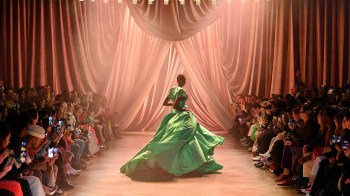Confronting piracy in the world of fashion
TEXT OF INTERVIEW
Kai Ryssdal: It’s Fashion Week in New York City. All the newest trends are out on the runways, offering a look at styles to come this spring. Here in LA, the fashion thing to do, which we have done, is take a stroll down to Santee Alley in downtown. A lot of what’s on display in New York is going to be showing up here in a matter of weeks. It will not, of course, be the real thing, as you can see by this wall of handbags in front of me. That one proposes to be an Ed Hardy bag, but for $29.99, I don’t think so. That one’s a Birkin knock-off, I’m pretty sure, there’s Burberry across the way, and a Gucci, as well.
But for a lot of people, the fakes are close enough, and they are just the right price: Cheap. For everybody here contemplating a trade in counterfeit goods, though, there is a proposed remedy. Fordham University in New York City is offering a first-of-its-kind program this year in fashion law.
Susan Scafidi runs it, and when we spoke, I asked her whether fashion lawyers might go about practicing their trade by doing what we did — going out and seeing what’s for sale.
Susan Scafidi:Cruising the knock-offs isn’t a bad idea, and certainly one of the things that fashion lawyers do, and certainly our students are already doing that, working with some fashion firms. But really a fashion lawyer can address any issue that arises throughout the life of a garment. From issues of intellectual property and ownership of the designs, to employment and labor relations issues, real estate issues, customs issues, issues of safety and sustainability and what constitutes “green” fashion, all the way up to issues that might arise when a consumer wears clothing. What is she permitted to wear to work, to school? So all of those questions are part of the life of a fashion lawyer.
RYSSDAL: Can you copyright a design? I mean, you can’t copyright a book title, can you?
Scafidi: Kai, no, you cannot copyright a fashion design in the United States at this point. However, I have been very involved working on legislation that would permit copyrighting of fashion designs, or rather a very, very short-term form of copyrighting — a three-year copyright. A good fashion lawyer needs to know the basics of the intellectual property system, but also get creative and borrow from areas of intellectual property law that might apply. We’re talking about the trademarks that protect labels and logos, for example. So it’s about getting creative with the lot out there and learning to apply it to the special needs of the fashion industry.
RYSSDAL: You can go to any fashion district in any city in this country or in the world and find knock-off after knock-off after knock-off. It does seem like your fight is without end.
Scafidi: Trying to shut down counterfeits and knock-offs is a little bit like trying to empty the ocean with a teaspoon. I think that the consumer doesn’t always understand the potential harm from carrying that fake Louis Vuitton purse. And the harm is particularly intense when it comes not to the big companies, but to the little ones, the ones whose names you might not even know but whose designs are stolen, sometimes even before they can get those designs to market.
RYSSDAL: How does this fit this movement you’re trying to start of fashion law and its importance in the industry? How does it fit in a world where you have things like “Project Runway,” where you know this design thing has become kind of a game?
Scafidi: The idea of design being part of our culture is also part of what’s making it more possible to respect and protect design. Once upon a time, fashion was that frivolous thing that girls did, that women did, maybe some gay men did, but surely not the upstanding members of the bench and bar who were attired in their pinstripes or their black robes. Now, as fashion becomes more and more part of American culture, it becomes something that we respect, and therefore something that we protect, as a key element of our economy and as a creative medium that we find enchanting and engaging. So fashion law is catching up with how the culture is starting to perceive fashion.
RYSSDAL: Susan Scafidi — she is the director of the Fashion Law Institute at Fordham Law School in New York City. Susan, thanks a lot.
Scafidi: Kai, it’s been a pleasure, thank you.
There’s a lot happening in the world. Through it all, Marketplace is here for you.
You rely on Marketplace to break down the world’s events and tell you how it affects you in a fact-based, approachable way. We rely on your financial support to keep making that possible.
Your donation today powers the independent journalism that you rely on. For just $5/month, you can help sustain Marketplace so we can keep reporting on the things that matter to you.


















